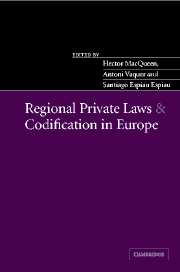Book contents
- Frontmatter
- Contents
- List of contributors
- Acknowledgements
- List of abbreviations
- Introduction
- 1 The civil law in European codes
- 2 ‘A token of independence’: debates on the history and development of Scots law
- 3 The Scottish civil code project
- 4 Scots law in Europe: the case of contract
- 5 Scottish property: a system of Civilian principle. But could it be codified?
- 6 ‘… Quae ad ius Cathalanicum pertinet’: the civil law of Catalonia, ius commune and the legal tradition
- 7 The codification of Catalan civil law
- 8 Unification of the European law of obligations and codification of Catalan civil law
- 9 From revocation to non-opposability: modern developments of the Paulian action
- 10 Epistle to Catalonia: romance and rentabilidad in an anglophone mixed jurisdiction
- 11 Estonia and the new civil law
- 12 The positive experience of the Civil Code of Quebec in the North American common law environment
- 13 From the code civil du bas Canada (1866) to the code civil Quebecois (1991), or from the consolidation to the reform of the law: a reflection for Catalonia
- 14 The evolution of the Greek civil law: from its Roman–Byzantine origins to its contemporary European orientation
- Index
10 - Epistle to Catalonia: romance and rentabilidad in an anglophone mixed jurisdiction
Published online by Cambridge University Press: 30 July 2009
- Frontmatter
- Contents
- List of contributors
- Acknowledgements
- List of abbreviations
- Introduction
- 1 The civil law in European codes
- 2 ‘A token of independence’: debates on the history and development of Scots law
- 3 The Scottish civil code project
- 4 Scots law in Europe: the case of contract
- 5 Scottish property: a system of Civilian principle. But could it be codified?
- 6 ‘… Quae ad ius Cathalanicum pertinet’: the civil law of Catalonia, ius commune and the legal tradition
- 7 The codification of Catalan civil law
- 8 Unification of the European law of obligations and codification of Catalan civil law
- 9 From revocation to non-opposability: modern developments of the Paulian action
- 10 Epistle to Catalonia: romance and rentabilidad in an anglophone mixed jurisdiction
- 11 Estonia and the new civil law
- 12 The positive experience of the Civil Code of Quebec in the North American common law environment
- 13 From the code civil du bas Canada (1866) to the code civil Quebecois (1991), or from the consolidation to the reform of the law: a reflection for Catalonia
- 14 The evolution of the Greek civil law: from its Roman–Byzantine origins to its contemporary European orientation
- Index
Summary
Preface
Twenty years ago, two of my colleagues joined me in publishing a slender pamphlet entitled The Louisiana Civil Code: A Humanistic Appraisal. A non-technical book aimed primarily at a readership untrained in law, it sketched the unusual history and social vision of the Louisiana Civil Code, which was first enacted by a fledgling Louisiana legislative assembly in 1808. Besides sketching the philosophical and historical foundations of the Civil Code, our pamphlet sought to reply to a persistent lament from lawyers in Louisiana and other states. In Louisiana's distinctive legal tradition, the lawyers thought they confronted unacceptable complications for their business practice and a futile resistance to a United States juggernaut driving us all toward legal uniformity. Against such criticism the pamphlet's contrarian authors persevered. For us, the unusual contour cut by the Louisiana Civil Code in the legal landscape of the United States was reason for celebration rather than lament. For the state's citizens, the Louisiana Civil Code was by 1981 a permanent fixture, fully incorporated for over 170 years into the state's legal institutions and undergoing extensive modernisation to suit it to social needs and law practice in the twenty-first century. Here is the celebratory introduction of our opening section entitled ‘Vive la différence’:
The Louisiana Civil Code, a one volume blueprint of society, is among the most significant landmarks in American legal history. Inspired by the continental Roman tradition rather than English law, the civil code makes Louisiana a civil law island in a common law sea. […]
- Type
- Chapter
- Information
- Regional Private Laws and Codification in Europe , pp. 221 - 249Publisher: Cambridge University PressPrint publication year: 2003



